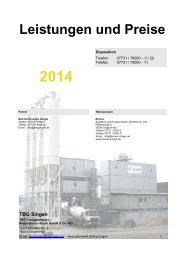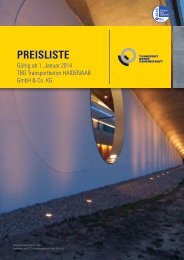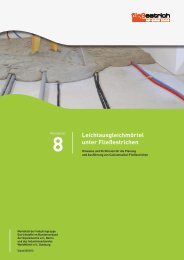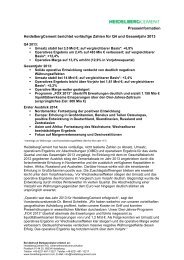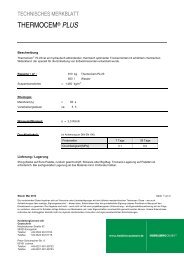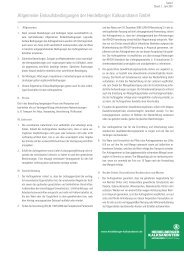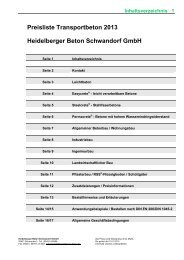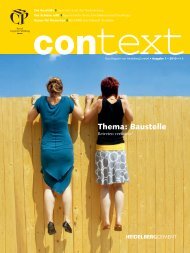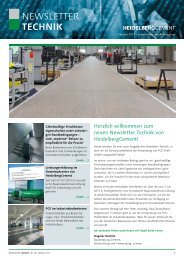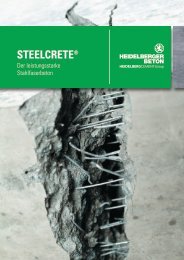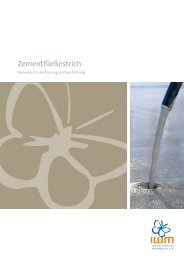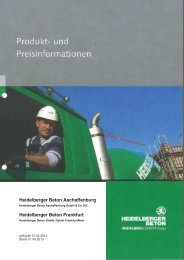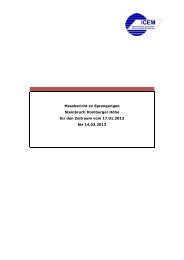TPCC Annual Report 2008.indd - HeidelbergCement
TPCC Annual Report 2008.indd - HeidelbergCement
TPCC Annual Report 2008.indd - HeidelbergCement
You also want an ePaper? Increase the reach of your titles
YUMPU automatically turns print PDFs into web optimized ePapers that Google loves.
Tanzania Portland Cement Company Ltd, <strong>Annual</strong> <strong>Report</strong> 2008<br />
IFRS 3R Business Combinations and IAS 27R Consolidated and Separate Financial Statements<br />
The revised standards were issued in January 2008 and become effective for financial years beginning on or after 1 July<br />
2009. IFRS 3R introduces a number of changes in the accounting for business combinations occurring after this date<br />
that will impact the amount of goodwill recognised, the reported results in the period that an acquisition occurs, and<br />
future reported results. IAS 27R requires that a change in the ownership interest of a subsidiary (without loss of control)<br />
is accounted for as an equity transaction. Therefore, such transactions will no longer give rise to goodwill, nor will it give<br />
rise to a gain or loss. Furthermore, the amended standard changes the accounting for losses incurred by the subsidiary<br />
as well as the loss of control of a subsidiary. Other consequential amendments were made to IAS 7 Statement of Cash<br />
Flows, IAS 12 Income Taxes, IAS 21 The Effects of Changes in Foreign Exchange Rates, IAS 28 Investment in Associates<br />
and IAS 31 Interests in Joint Ventures. The changes inherent in IFRS 3R and IAS 27R does not have any impact on the<br />
Company’s financial statements.<br />
IAS 1 Revised Presentation of Financial Statements<br />
The revised Standard was issued in September 2007 and becomes effective for financial years beginning on or after 1<br />
January 2009. The Standard separates owner and non-owner changes in equity. The statement of changes in equity<br />
will include only details of transactions with owners, with non-owner changes in equity presented as a single line. In<br />
addition, the Standard introduces the statement of comprehensive income: it presents all items of recognised income<br />
and expense, either in one single statement, or in two linked statements. The Company is still evaluating whether it will<br />
have one or two statements.<br />
IAS 32 Financial Instruments: Presentation and IAS 1 Presentation of Financial Statements – Puttable Financial Instruments<br />
and Obligations Arising on Liquidation<br />
These amendments to IAS 32 and IAS 1 were issued in February 2008 and become effective for financial years beginning<br />
on or after 1 January 2009. The revisions provide a limited scope exception for puttable instruments to be classified as<br />
equity if they fulfil a number of specified features. The amendments to the standards will have no impact on the finan-<br />
cial position or performance of the Company, as the Company has not issued such instruments.<br />
IAS 39 Financial Instruments: Recognition and Measurement – Eligible Hedged Items<br />
These amendments to IAS 39 were issued in August 2008 and become effective for financial years beginning on or after<br />
1 July 2009. The amendment addresses the designation of a one-sided risk in a hedged item, and the designation of<br />
inflation as a hedged risk or portion in particular situations. It clarifies that an entity is permitted to designate a portion<br />
of the fair value changes or cash flow variability of a financial instrument as hedged item. The Company has concluded<br />
that the amendment will have no impact on the financial position or performance of the Company, as the Company has<br />
not entered into any such hedges.<br />
Improvements to IFRSs<br />
As stated in Note 4 the Company has opted for early adoption of some of the amendments to standards following the<br />
2007 ‘Improvement to IFRSs’ project. The Company has not yet adopted the following amendments and anticipates<br />
that these changes will have no material effect on the financial statements.<br />
• IFRS 7 Financial Instruments: Disclosures: Removal of the reference to ‘total interest income’ as a component<br />
of finance costs.<br />
• IAS 8 Accounting Policies, Change in Accounting Estimates and Errors: Clarification that only implementation<br />
guidance that is an integral part of an IFRS is mandatory when selecting accounting policies.<br />
43



